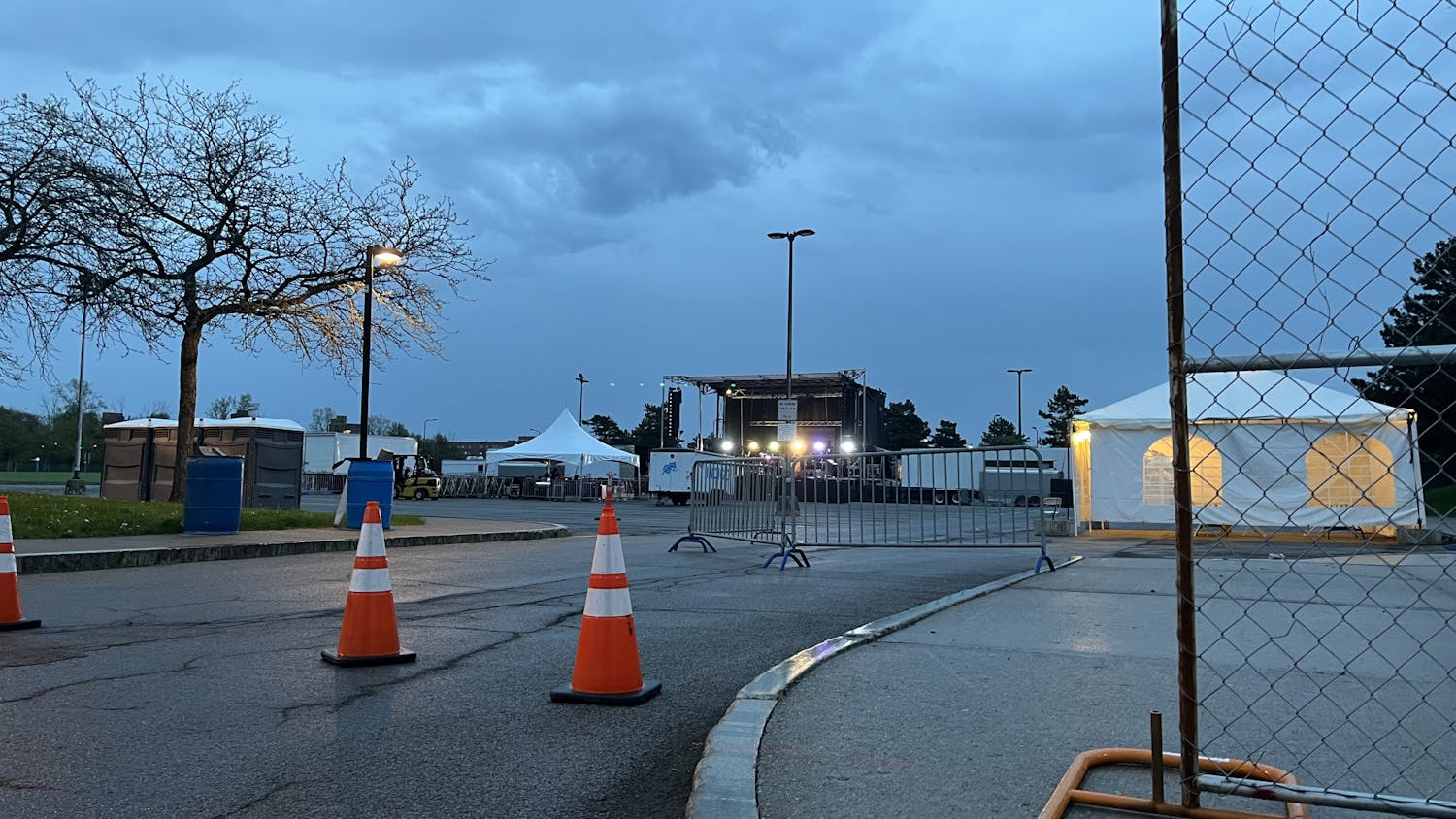Offering a big-picture perspective of issues within the UB community, Chronicle of Higher Education Managing Editor Douglas Lederman addressed the Faculty Senate Tuesday afternoon in the Center for Tomorrow.
"I always welcome the opportunity to speak to the men and women of higher education," said Lederman, who was born in Buffalo. "You are who we do our work for."
Lederman briefly explained what he considered the Chronicle's place in the academic world. "We take very seriously our watchdog role," Lederman said, although he did admit, "it's not uncommon for people to call us the 'Chronicle for Higher Education.'"
Part of the reason for that grammatical slip, he feels, is the fact that a large portion of the Chronicle's readership comes from the administrators and educators within the world of higher education. He stressed the Chronicle's independence from any particular academic institution as a major reason that reputation is inaccurate.
"This ought to be a terrific time" for higher education, said Lederman, citing growing recognition of the need for higher education and the fact that people are returning to college after years spent away. Yet, he said, "it clearly is not," due in part to the public's increased scrutiny of those same institutions.
Past mistakes and practices, he said, have shown universities to be fallible and left the public wary of total acceptance, forcing the system of higher education to justify its decisions and policies.
"Colleges can no longer count on" unconditional support, he said.
A major concern for UB administrators and students alike has been the university's place in the collegiate and economic universes. Lederman mentioned what he called a blurring of the traditional hierarchical structure of that world: Ivy Leagues on top, followed by flagship state universities, top private colleges, liberal arts colleges, community colleges and finally for-profit colleges.
Lederman cited institutional financing as one example of this smudging. In the past, private colleges and universities exerted their largest effort courting private donors, while public institutions solicited funds from state governments.
"I know that's a particularly thorny issue around here," said Lederman. He pointed to UB President William R. Greiner as a public university administrator who has recently concentrated on fundraising from alumni in the university's Generation to Generation campaign.
The academic world has also seen a shift in the centers of educational power from traditional Northeastern strongholds to colleges such as Stanford and Duke in the West and the South.
"This has happened for a bunch of reasons," Lederman said. "The spread of enormous merit-based scholarship programs like Georgia's Hope scholarship [are] keeping more and more of their state's top students at home, and barriers are falling away in the past that may have made some groups feel unwelcome."
When asked about the national trend in treating higher education as a measurable commodity, including the proliferation of college surveys and rankings, Lederman's response was pointed but noncommittal.
"It's less tangible than that," he said. "But I don't think there's any way around it."
The push to measure outcomes and learning comes partially from the very real needs of administrators, legislators and even students to be able to weigh the educations at various universities against one another, a need companies such as the U.S. News & World Report and the Princeton Review serve with their publication of annual rankings.
"The rankings are stupid," said Lederman, when one of the attendees suggested the Chronicle perform some sort of ranking. "We're not going there."
The issue of standardized tests' usefulness in admissions was raised by Henry Durand, director of UB's Center for Academic Development Services.
"The colleges embraced standardized testing because it made it easier to compare students from different schools," Lederman said. Although the tests reduce knowledge to mere numbers, Lederman pointed out that colleges "don't feel they can afford to [stop using the tests]" and that the SATs are "unlikely to go away."
If colleges and universities were to stop using the exams on a widespread scale, he said, the tests would likely be replaced by another exam or exams.
"The post-SAT scenario is kind of mind-boggling," said Lederman. "It's hard for me to imagine it being fairer and better."
UB English Professor Barbara Bono raised the issue of Ph.D. education at UB and across the nation, questioning whether Lederman thought too many Ph.D. programs existed and how such programs should best be adapted to a university like UB.
Lederman pointed out that one of the United States' greatest strengths has always been the absence of a central higher education system, providing students and faculty a wider variety of educational options. The lack of national uniformity, however, can lead to a duplication of services.
"I think there is a great problem in higher education of too many universities wanting to do too many things and the number of mid-level universities that have added doctorate programs to catch up or keep up with the flagship universities," he said. "I think there are some serious questions about whether that's wise."
Treatment of part-time faculty also came up as a salient issue in higher education.
"Faculty unions are in a very difficult position," said Lederman, pointing out that some unions - such as the union at UB - represent both full- and part-time faculty, a situation that mostly likely will lead to a conflict of interests.
Still, he said, the two groups have "more mutual interests than opposed ones" and recommended the two "get aligned" for increased effectiveness.
Universities and colleges have followed the trend of other industries in hiring cheap labor, a practice he called "terribly unfair," albeit cost-effective. If the system of higher education is going to use part-time help, he said, then the system should at least insure that the help is treated fairly.
On a related topic, Michael Cohen, chair of the Faculty Senate, asked Lederman his opinion on the levels of graduate stipends in universities and colleges across the nation. While Lederman said it was not easy to draw a comparison across the spectrum of universities, "we took a stab at trying to standardize it" in a recent Chronicle survey of stipends within the Association of American Universities.
The result, he said, was a wide variation of wages. His recommendation was that universities decide the level of graduate students they can "support comfortably" and stick with that.
"I don't see any advantage to supporting more people less well," he said.
Lederman came to UB on his own time and money following an invitation from Cohen,. The Chronicle has a strict policy of not allowing its staff to speak at universities or colleges on a paid basis to avoid possible conflicts of interest.
Lederman has worked for the Chronicle for 15 years, holding his current position for two. His father attended UB, and Lederman himself was born in Buffalo, although he grew up in Cleveland. After attending Princeton University, he spent several years at the New York Times before moving to the Chronicle.




